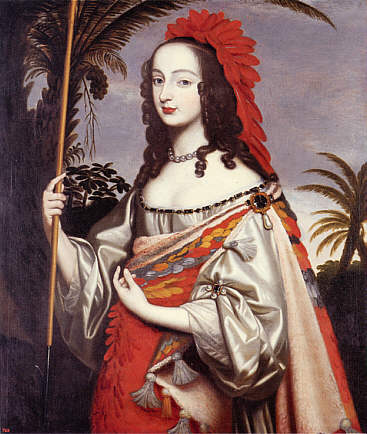 |
| Sophie of the Palatinate, electress of Hanover, in her younger days. [Public domain], via Wikimedia Commons |
Fifty years later, when she sat down to write her memoirs, she recorded the impression that "as I was the twelfth fruit of the King, my father and the Queen, my mother, I believe that my birth did not cause them any great joy, other than that I no longer occupied the post that I had held."
At birth, she was granted an annuity of 40 thalers by the Estates of Friesland, while three high-born ladies named Sophia (the Princess Palatine of Birkenfield, the Countess of Coulenberg and Madame de Brederode, Countess of Nassau-Dietz) were found to act as godmothers.
Until her marriage, in 1658 to Ernest Augustus, Elector of Brunswick-Lüneburg, she would be known as Sophie, Princess Palatine of the Rhine, or as Sophia of the Palatinate. In 1692 her husband became the first Elector of Hanover and she herself went by the title of Sophia, Electress of Hanover between 1692 and 1698.
Under the terms of the Act of Settlement, passed by the Parliament of England in 1701, she became heiress presumptive to the crowns of the Kingdom of England and the Kingdom of Ireland (subsequently, the unified throne of the Kingdom of Great Britain following the Acts of Union 1707).
 |
| Sophia, dressed as an Indian. Painted by her sister (circa 1644), Louise Hollandine of the Palatinate (www.zum.de/.../rhein/pfalz/sophie.htm) [Public domain], via Wikimedia Commons |
Therefore for a further Provision of the Succession of the Crown in the Protestant Line We Your Majesties most dutifull and Loyall Subjects the Lords Spirituall and Temporall and Commons in this present Parliament assembled do beseech Your Majesty that it may be enacted and declared and be it enacted and declared by the Kings most Excellent Majesty by and with the Advice and Consent of the Lords Spirituall and Temporall and Commons in this present Parliament assembled and by the Authority of the same That the most Excellent Princess Sophia Electress and Dutchess Dowager of Hannover Daughter of the most Excellent Princess Elizabeth late Queen of Bohemia Daughter of our late Sovereign Lord King James the First of happy Memory be and is hereby declared to be the next in Succession in the Protestant Line to the Imperiall Crown and Dignity of the forsaid Realms of England France and Ireland with the Dominions and Territories thereunto belonging after His Majesty and the Princess Anne of Denmark and in Default of Issue of the said Princess Anne and of His Majesty respectively.
She died less than two months before she would have become queen. Her claim to the throne thus passed to her eldest son, George Louis, Elector of Hanover, who ascended as George I on 1 August 1714 (Old Style).
Source Material:
- Sophia of Hanover: Winter Princess by J.N. Duggan. Published by Peter Owen Publishers, 2010. ISBN 978 0 7206 1342 1. Available to buy online.
- Wikipedia – Sophia of Hanover
